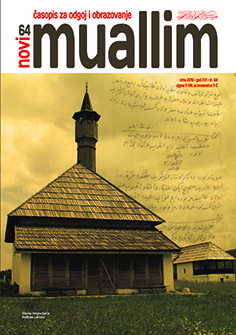HASAN KAFI’S UNDERSTANDING OF POLITICS
Ottoman, West-European and Bosnian context – lessons for contemporary time
DOI:
https://doi.org/10.26340/muallim.v16i64.93Keywords:
politics, ethics, justice, wisdom, authority, legitimacy, sovereignty, Hasan Kafi PruščakAbstract
UDK 321.1:28
This article presents the most important guidelines in understanding political views of Hasan Kafi Pruščak in “Usulu’l-Hikem fi Nizami’l-Alem” (Principles of Wisdom for the Order of the World) written in year 1595, during his engagement as qadi in Prusac. In the first chapter of the work, essential political terminology: power, government, authority, legitimacy and sovereignty are presented as are defined in political studies today. The second chapter focuses on justice and general good as a foundation of politics as envisaged by Kafi. Further we see how Kafi is stressing upon the importance of delegating political responsibilities, mandates and positions to capable, worthy, suitable educated and competent people. Thirdly we present Kafi’s view of the significance and the role of organization of army, morale of soldiers, modern armament, the ruler’s engagement in terms of the readiness and the discipline especially during warfare, in politics. In the third chapter we dealt with Kafi’s political theory in historical context of the Ottoman legislative, political and state order. In the fourth chapter we presented some significant references to West European interest in Kafi’s work. In fifth chapter we pointed out the significance of Kafi’s work and thought to contemporary Bosnian context. In the conclusion it is stressed that Kafi’s political thought, basing the power, government, authority, legitimacy and sovereignty upon Islamic sources and Islamic ethical principles, is concentrated on justice and good governance whose peek is realized in peace.
Downloads
Published
How to Cite
Issue
Section
License
Naknada:
a. Časopis ne naplaćuje naknadu za obradu članaka (APC) i naknadu za podnošenje članaka.
Autori koji objavljuju u ovom časopisu pristaju na sljedeće uvijete:
- Autori zadržavaju autorska prava i pružaju časopisu pravo prvog objavljivanja, pri čemu će rad jednu godinu po objavljivanju biti podložan licenci Creative Commons imenovanje koja omogućuje drugima da dijele rad uz uvijet navođenja autorstva i izvornog objavljivanja u ovom časopisu.
- Autori mogu izraditi zasebne, ugovorne aranžmane za ne-ekskluzivnu distribuciju rada objavljenog u časopisu (npr. postavljanje u institucionalni repozitorij ili objavljivanje u knjizi), uz navođenje da je rad izvorno objavljen u ovom časopisu.


